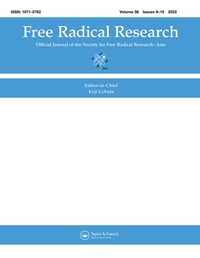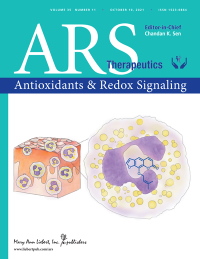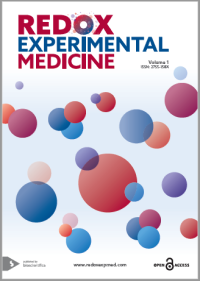Other relevant journals
Free Radical Research

Website: https://www.tandfonline.com/toc/ifra20/current
Research on free radicals/reactive species in various systems; redox signaling; diet-derived antioxidants; and mechanisms and measurements of oxidative damage.Editor-in-Chief:
- Koji Uchida - Graduate School of Agricultural and Life Science, The University of Tokyo, Japan
Associate Editors
- Helen Griffiths - University of Surrey, UK
- Rafael Radi - Universidad de la Republica, Uruguay
- Corinne M Spickett - Aston University, UK
- Young-Joon Surh - Seoul National University, South Korea
- Shinya Toyokuni - Nagoya University, Japan
- Christian Schoneich - University of Kansas, USA
- Robert Salomon - Case Western Reserve University, USA
- Etsuo Niki - National Institute of Advanced Industrial Science and Technology, Japan
- Claus Schneider - Vanderbilt University, USA
Aims and scope
Free Radical Research aims to publish high-quality research papers, hypotheses and reviews in all areas in the fields of:
- Free radicals and other reactive species in biological, clinical, environmental and other systems
- Redox signalling
- Antioxidants, including diet-derived antioxidants and other relevant aspects of human nutrition
- Oxidative damage, mechanisms and measurement
Authors can choose to publish gold open access in this journal.
Antioxidants and Redox Signalling
 Web link: https://home.liebertpub.com/publications/antioxidants-and-redox-signaling/4//overview
Web link: https://home.liebertpub.com/publications/antioxidants-and-redox-signaling/4//overview
Antioxidants & Redox Signaling (ARS) is a leading peer-reviewed journal dedicated to understanding the vital impact of oxygen and oxidation-reduction (redox) processes on human health and disease. The Journal explores key issues in genetic, pharmaceutical, and nutritional redox-based therapeutics.
Cutting-edge research focuses on structural biology, stem cells, regenerative medicine, epigenetics, imaging, clinical outcomes, and preventive and therapeutic nutrition, among other areas.
ARS has expanded to create two unique foci within one journal: ARS Discoveries and ARS Therapeutics. ARS Discoveries (24 issues) publishes the highest-caliber breakthroughs in basic and applied research. ARS Therapeutics (12 issues) is the first publication of its kind that will help enhance the entire field of redox biology by showcasing the potential of redox sciences to change health outcomes.
ARS coverage includes:
ROS/RNS as messengers
Gaseous signal transducers
Hypoxia and tissue oxygenation
microRNA
Prokaryotic systems
Lessons from plant biology
ARS is under the editorial leadership of Editor-in-Chief Chandan K. Sen, PhD, Indiana University School of Medicine, and other leading investigators. View the entire editorial board.
Audience: Cell biologists, molecular biologists, biochemists, medical researchers, and nutritionists, among others.
ARS provides "Instant Online" publication 72 hours after acceptance.
Average time to first decision: 16 days
Average time to triage decision: 48 hours
Redox Experimental Medicine
 Web link: https://rem.bioscientifica.com/
Web link: https://rem.bioscientifica.com/
Redox Experimental Medicine is an open-access, peer-reviewed journal publishing redox research that advances our understanding of the effect of redox processes on human health and disease.
Aberration in redox processes has a profound impact on the normal physiology of humans, with an implication in many diseases. Redox Experimental Medicine will serve as an essential publication for the international scientific community to translate experimental knowledge to redox-based preventive and/or therapeutic interventions, with a view to advancing health. The journal will publish basic and translational articles which have potential therapeutic relevance, as well as pre-clinical and clinical studies.
Redox Experimental Medicine will cover all main areas of human pathophysiology, with special but not limited focus on healthy ageing and age-related diseases, cancer, cardiac and circulatory diseases, inflammatory-driven chronic diseases, endocrine and metabolic diseases, pregnancy, perinatal and newborn pathology, neurodegeneration, and infectious diseases. Redox-related nutrition and pharmacology will perfectly fit into the scope of the journal as well.
Redox Experimental Medicine will consider for publication all articles which are scientifically sound. We welcome the following article types: research papers (including clinical trials), reviews, brief communications, debates and commentaries. The journal will also publish occasional invited special issues. The journal will accept quality observational studies, following thorough review.
The journal is newly launched, and as such does not yet have an impact factor. We aim to achieve indexing in PubMed as soon as possible, after which point all published articles will be indexed retrospectively. We also aim to achieve indexing in Web of Science so that the journal receives an impact factor as soon as possible, but unlikely to be sooner than 4 years after launch.
The Editorial Board aims to provide rapid and constructive peer review and will aim to give you a first decision within three weeks. The journal operates single anonymous peer review.
